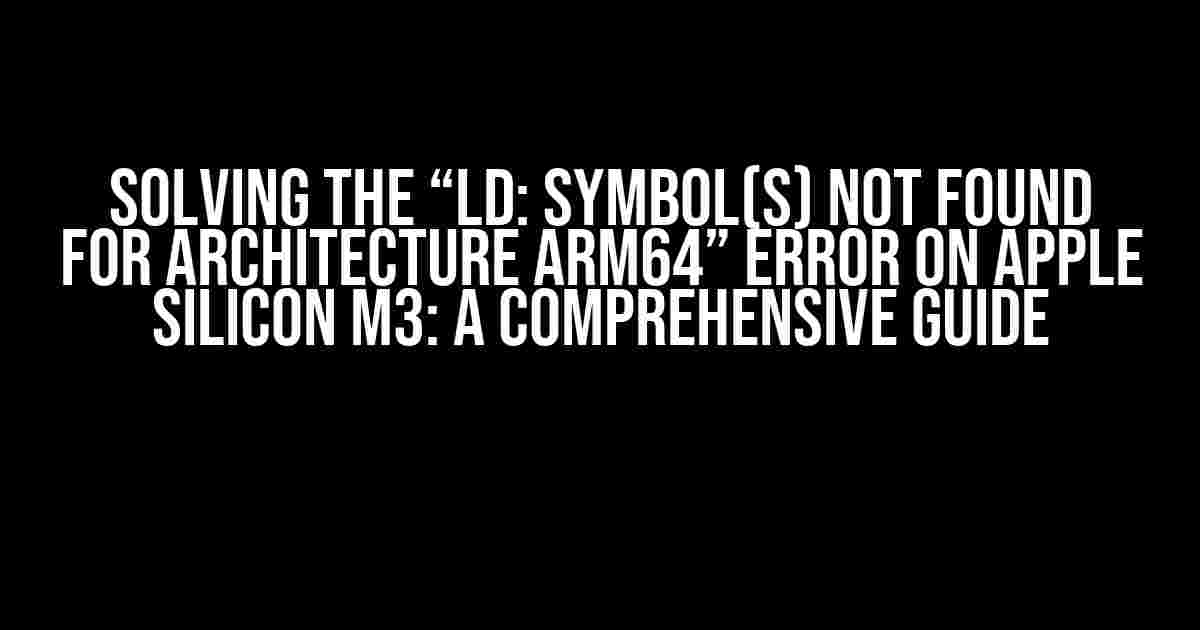If you’re a developer working on an Apple Silicon M3-based project, you might have stumbled upon the frustrating “ld: symbol(s) not found for architecture arm64” error. This error can be a major roadblock in your development process, but don’t worry, we’ve got you covered! In this article, we’ll delve into the causes of this error, provide clear instructions on how to fix it, and offer some valuable tips to avoid it in the future.
What causes the “ld: symbol(s) not found for architecture arm64” error?
The “ld: symbol(s) not found for architecture arm64” error typically occurs when the linker (ld) is unable to find the required symbols or libraries for the arm64 architecture. This can happen due to various reasons, including:
- Incompatible or outdated libraries
- Mismatched architecture settings in Xcode
- Missing or incorrect framework imports
- Invalid or corrupted project settings
- Inadequate or incomplete installation of development tools
Step-by-Step Guide to Fixing the Error
Now that we’ve identified the possible causes, let’s get down to business and fix this error once and for all! Follow these steps carefully to resolve the issue:
Step 1: Verify Xcode and Development Tool Installation
Ensure that you have the latest version of Xcode installed, and that your development tools are up-to-date. You can check for updates in the App Store or by running the following command in your terminal:
xcode-select --installStep 2: Check Architecture Settings in Xcode
In your Xcode project, navigate to the project settings by clicking on the project icon in the left sidebar. Then, select the target and click on the “Build Settings” tab. In the “Architectures” section, ensure that the following settings are configured correctly:
| Setting | Value |
|---|---|
| Architectures | arm64 |
| Valid Architectures | arm64 |
Step 3: Verify Framework Imports and Libraries
Review your project’s framework imports and libraries to ensure that they are compatible with the arm64 architecture. You can do this by:
- Checking the framework’s documentation for arm64 support
- Verifying the framework’s architecture settings in its build settings
- Ensuring that the framework is correctly linked to your target
Step 4: Clean and Rebuild Your Project
Sometimes, a simple clean and rebuild can resolve the issue. To do this, follow these steps:
- Click on “Product” in the top menu bar
- Select “Clean” to clean the project
- Click on “Product” again
- Select “Build” to rebuild the project
Step 5: Check for Missing or Corrupted Project Settings
If the above steps don’t resolve the issue, it’s possible that your project settings are corrupted or missing. Try:
- Deleting the derived data folder for your project
- Resetting the project’s build settings to their default values
- Re-creating the project settings from scratch
Tips and Tricks to Avoid the Error in the Future
To avoid encountering the “ld: symbol(s) not found for architecture arm64” error in the future, follow these best practices:
- Regularly update your development tools and Xcode
- Verify the architecture settings for each new project
- Use compatible and up-to-date libraries and frameworks
- Maintain a clean and organized project structure
- Test your project regularly to catch errors early
Conclusion
That’s it! By following these steps and tips, you should be able to resolve the “ld: symbol(s) not found for architecture arm64” error on your Apple Silicon M3-based project. Remember to stay vigilant and proactive in maintaining your project’s settings and dependencies to avoid encountering this error in the future.
If you have any further questions or concerns, feel free to ask in the comments below. Happy coding!
Frequently Asked Question
If you’re struggling with the “ld: symbol(s) not found for architecture arm64” error on your Apple Silicon M3, you’re not alone. Here are some frequently asked questions that might just solve your problem!
What is the main cause of the “ld: symbol(s) not found for architecture arm64” error?
This error usually occurs when the linker (ld) is unable to find the necessary symbols or libraries for the arm64 architecture, which is used by Apple Silicon M3 chips. This can happen if you’re using an outdated or incompatible library, or if there’s a mismatch between the architecture of your project and the libraries it depends on.
How can I check if my project is compatible with the arm64 architecture?
You can check your project’s architecture compatibility by running the `lipo -info` command on your library or executable file. This will display the architectures supported by your file. If you don’t see arm64 listed, you may need to rebuild your project with arm64 support or use a compatible library.
What are some common libraries that might cause the “ld: symbol(s) not found for architecture arm64” error?
Some common libraries that might cause this error include outdated versions of SQLite, OpenSSL, or other dependencies that haven’t been updated to support arm64. You may need to update these libraries or use alternative versions that are compatible with arm64.
Can I use a workaround to fix the “ld: symbol(s) not found for architecture arm64” error?
Yes, one common workaround is to use the `-Wl,-slice-arch arm64` flag when compiling your project. This tells the linker to only use the arm64 architecture, which can help avoid compatibility issues. However, this may not always work and is not a long-term solution, so it’s recommended to resolve the underlying issue instead.
How can I ensure that my project is fully compatible with Apple Silicon M3 chips?
To ensure full compatibility, make sure to test your project on an Apple Silicon M3 chip device or simulator, and verify that it works as expected. Additionally, review your project’s dependencies and libraries to ensure they are updated to support arm64, and use the `lipo -info` command to verify architecture compatibility.




